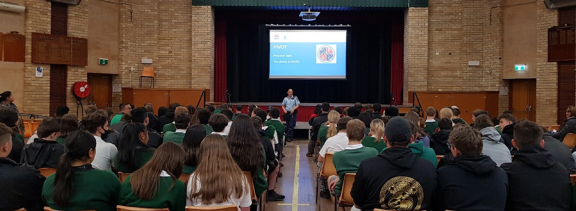Between police and young people – every conversation matters
The Office of the Children’s Guardian has joined an important forum to guide the interaction of police and other government and community agencies with children and young people who break the law or are at risk of offending.

Youth Action Meetings are monthly forums led by the NSW Police Force and involving government and non-government agencies and services in the local community.
The Office of the Children’s Guardian has joined the NSW Department of Education, NSW Health and Department of Communities and Justice as part of this network to support community safety and wellbeing, particularly in regional NSW. The focus is on strengthening early intervention and prevention programs for young people.
This initiative has been expanded as part of government reforms announced in March this year.
At a Youth Action Meeting forum held in Goulburn 10-11 September, the Office of the Children’s Guardian was represented by Ken Moroney, former Commissioner of the New South Wales Police Force.
Addressing the forum, Mr Moroney focused on the theme of this year’s Child Protection Week – Every conversation matters.
He stressed the importance of listening to children and young people and recognising the issues many face.
When addressing one of the greatest issues impacting on every society, namely, crime and anti-social behaviour, I reiterate a phrase that I have used before, namely, we cannot arrest our way out of these problems … Courts, Prisons and Juvenile Detention Institutions have to be part of the criminal justice system. Of course they do. But we need also to turn our minds to preventing young people from getting before those state-based institutions in the first place and not after the event.
He said that in his discussions with at-risk children and young people, he found some consistent themes, including the impact of family violence, insecure housing, poverty and mental health.
The Royal Commission into Institutional Responses to Child Sexual Abuse recognised that uplifting the voices of children and young people was a key element of preventing abuse.
The basis of the where to from here, is founded in the ten Child Safe Standards in particular Standard 2 – young people participating in decisions affecting them and they are taken seriously, and Standard 3 – families and communities are consulted, informed and involved.
Youth Action Meetings will continue to provide a coordinated approach across services for identified vulnerable youth, to address the needs of young people at risk of significant harm, particularly those at risk of becoming a victim or offender of crime, with the Office of the Children’s Guardian playing a role in putting the needs of children and young people first.
